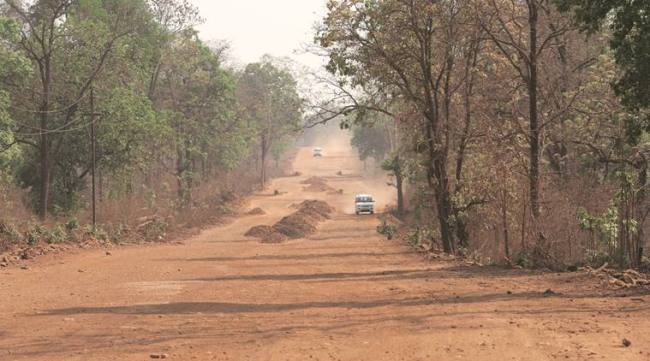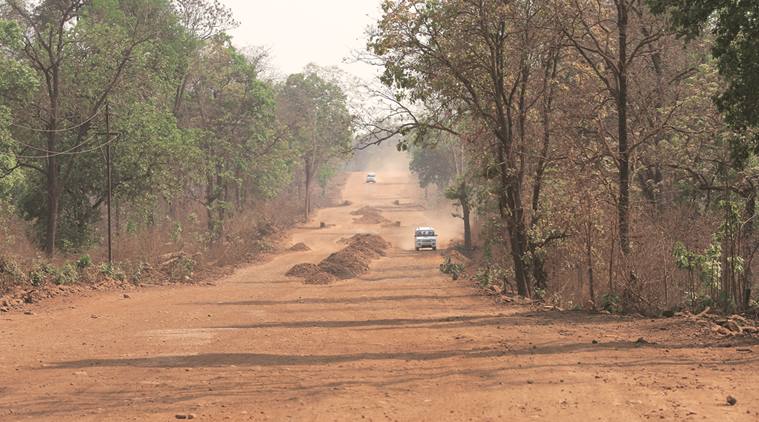Opinion Bastar tribals can teach a thing or two to Ivanka-led global summit
Apart from obvious economic benefits, state-tribal cooperation also moderates the narrative of Maoist influence, never far away from any venture in Dantewada.
 The to be constructed to CC cemented road between Sukma and Konta , half of the road has been done, NH 30, On Saturday, April 15, 2017. Express photo by Abhinav Saha
The to be constructed to CC cemented road between Sukma and Konta , half of the road has been done, NH 30, On Saturday, April 15, 2017. Express photo by Abhinav Saha  A cement road being laid between Sukma and Konta. (file/Express photo by Abhinav Saha)
A cement road being laid between Sukma and Konta. (file/Express photo by Abhinav Saha)
A fortnight ago, as a precursor to the Ivanka Trump-attended Global Entrepreneurship Summit in Hyderabad which begins today, another summit took place in in Dantewada, in Chhatisgarh. Called the Tribal Entrepreneurship Summit, it saw the attendance of entrepreneurs from all over the country from tribal areas, who sat in the relatively new and shiny Atal Bihari Vajpayee Auditorium in Dantewada and narrated their ideas to their peers.
Inside the hall, a massive projector relayed the speech of a minister of the Union government, and a message from MS Swaminathan, often called the “father” of Indian agriculture. For many in Bastar all of this was new, even a novelty. The real discussions were happening outside.
In the lawns outside, the stalls stood cheek-by- jowl. Each came from a different tribal district in Chhattisgarh, some from neighbouring Odisha. As local tribal farmers from Dantewada slowly walked from one to the other, and found an unassuming someone behind the counter who seemed very much like them, the interactions opened up. Some asked whether coffee from Koraput could be grown in Dantewada, others talked about improving tamarind production. Most popular was a stall called ‘Bhoomgaadhi’, a farmer cooperative aided by the state government which is helping farmers return to organic farming using their unique knowledge set that have passed down from generations. Perhaps this is slowly turning into a model for the future.
Across the jungles of Bastar, where myriad tribes have lived in harmony with nature for generations, visiting journalists, academics and researchers nearly always ask questions about education. Often, an answer will come that will point to the difference between being illiterate and being unlettered. For even though there might be a lack of formal education, the tribes have a wisdom of their own.
The trees, the sky, the night, the animals that abound in the forest don’t fill them with dread. There is no fear of the unknown. Simply because they aren’t the unknown. They share an intimate, symbiotic relationship, where one nourishes the other. The trees speak. So does the earth. And now, even district administrations have begun to bank on those conversations.
In Kuakonda and Katekalyan for instance, two parts of Dantewada that are still considered severely Maoist-affected, the ‘Bhoomgaadhi’ cooperative is now beginning to market and sell 35 different varieties of rice – a diversity found across a mere 10-village area. Chhattisgarh itself records 22000 different types of rice. For generations, farmers in these parts have known of their medicinal qualities, some good for joint pains, others good for an upset stomach. That understanding, that has little explanation, except for their relationship with the soil and the crop, is now becoming financially viable.
Checks and balances are required, of course. The lines that merge into superstition and myth are thin and often crossed; officials in Dantewada are at the moment using science to verify claims before they market. Before ‘Bhoomgaadhi’ products are sold, for instance, they are tested at government run institutes and certified.
But if there are doubts about claims made from indigenous learning, the inverse is true as well. Officials repeatedly narrate tales of how claims made by farmers, of medicinal properties that certain varieties of rice contain, are borne out by science. Further, this knowledge of tribal villagers doesn’t negate the need for formal education. Modern technology can often be complementary. In the age of scale, there remains the need to maximise output of these organic crops. Training sessions for System Rice Intensification(SRI), which details with the optimum space required between two planted stalks, or the kind of organic fertilisers that will maximise output must be imparted.
Apart from the obvious economic benefits, such state-tribal cooperation also moderates the narrative of Maoist influence, never far away from any venture in Dantewada. Much Maoist support in the forests of Bastar is based not only on a development vacuum that existed for many years, but also in that vacuum, the sense of unfamiliarity and distance that has developed between the administration and its residents.
The Maoist construct of the idea of the state is the “other”. The being that failed to understand the sensitivities of the people, that spoke another language, that had no regard for their well being, their traditions, or their customs. A state that dismissed any tribal idea as archaic, or illiterate.
That is why ‘Bhoomgaadhi’ is fundamentally an example of a long-delayed acknowledgement of respect. That respect is now becoming a two-way street. Once upon a time, Maoist decrees meant that no “outsiders” could enter the villages of Katekalyan. Now, government officials working on organic farming are welcomed by the villagers. The doors of communication are slowly opening. And therein lies both the tragedy and irony of Bastar. This encouragement of organic tribal farming from the government has come, after farmers in Dantewada, in particular, complained that government policies in previous years to increase production were becoming counterproductive.
Their obsession with homogenous high yielding seeds were killing local diversity. Paired with chemical fertilisers, the soil was turning into a wasteland. Within Dantewada itself, there are varying degrees of Maoist influence. Areas along the National Highway or near the district headquarters like Geedam have seen high government influence the planting of homegenised crops, while places like Katekalyan and Kuakonda, distant and hostile, have stuck to their age old methods of agriculture, untouched by “modernity”.
Yet even as the state government attempts to scale up organic farming, hoping to one day reach the day when rice supplied to anganwadis is produced locally, it is now urging farmers who once used government seeds and fertilisers to return to ways they once knew. In Dantewada, it is the eating of this humble pie that could be the beginning of a renewed and lasting relationship between the state and the citizens it once forgot to respect.




